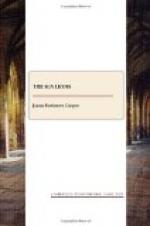Around the hut the snow early made vast embankments. Every one accustomed to the action of this particular condition of one of the great elements, will understand that a bend in the rocks outward, or a curve inward, must necessarily affect the manner in which these banks were formed. The wind did not, by any means, blow from any one point of the compass; though the south-western cliffs might be almost termed the weather-side of the island, so much more frequently did the gales come from that quarter than from any other. The cape where the cove lay, and where the house had been set up, being at the north-eastern point, and much protected by the high table-land in its rear, it occupied the warmest situation in the whole region. The winds that swept most of the north shore, but which, owing to a curvature in its formation, did not often blow home to the hut, even when they whistled along the terrace only a hundred feet beneath and more salient, were ordinarily from the south-west outside; though they got a more westerly inclination by following the land under the cliffs.
A bank of snow may be either a cause of destruction or a source of comfort. Of course, a certain degree of cold must exist wherever snow is to be found; but, unless in absolute contact with the human body, it does not usually affect the system beyond a certain point. On the other hand, it often breaks the wind, and it has been known to form a covering to flocks, houses, &c., that has contributed essentially to their warmth. We incline to the opinion that if one slept in a cavern formed in the snow, provided he could keep himself dry, and did not come in absolute contact with the element, he would not find his quarters very uncomfortable, so long as he had sufficient clothing to confine the animal warmth near his person. Now, our sealers enjoyed some such advantage as this; though not literally in the same degree. Their house was not covered with snow, though a vast bank was already formed quite near it and a good deal had begun to pile against the tent. Singular as it may seem, on the east end of the building, and on the south front, which looked in towards the cliff next the cove, there was scarcely any snow at all. This was in part owing to the constant use of the shovel and broom, but more so to the currents of air, which usually carried everything of so light a nature as a flake to more quiet spots, before it was suffered to settle on the ground.
Roswell early found, what his experience as an American might have taught him, that the melting of the snow, in consequence of the warmth of the fires, caused much more inconvenience than the snow itself. The latter, when dry, was easily got along with; but, when melted in the day, and converted into icicles at night, it became a most unpleasant and not altogether a safe neighbour; inasmuch as there was really danger from the sort of damp atmosphere it produced.




